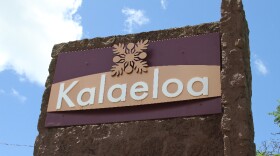HPR was out in Waikīkī on Tuesday morning, where we got the chance to observe a homeless count at 3 a.m. It’s a survey that the Waikīkī Business Improvement District has been tracking since 2006.
The numbers are shared with the city and state, and then the state usually works with the nonprofit Partners in Care for the annual point-in-time count.
Partners in Care announced it would do its count in the homeless shelters, but would not be out in the field as it's not a requirement for this year. So the data point provided by this survey is helpful.
Honolulu patrol officers and outreach workers accompanied University of Hawaiʻi urban planning students as they gathered out front of the Waikīkī Police Substation.
Organizers handed out flashlights and gave last-minute instructions as teams of six split up to cover the territory from the Ala Wai Boat Harbor to Kapiʻolani Park and everything in between.

We surveyed the beach fronting the Royal Hawaiian Hotel. Urban planning professor Karl Kim said that over the nearly two decades that he's been walking around this area, the numbers have fluctuated, and they are down by about 11% in the urban core and down 18% in the adjacent areas.
“I think there was a big impact when they closed the beach. Prior to that this would be kind of an ideal location, right? Because it's flat, more accessible,” Kim said.
Last time Kim was in the area, he recalled seeing at least 15 individuals experiencing homelessness.

Trevor Abarzua is the president of the Waikīkī Business Improvement District. He believes the reduced numbers are thanks to the teams of ambassadors dispatched to patrol the area.
“We have a team of overnight ambassadors that go out, and it's a team of three… and what they do is the Kūhiō Beach Park closes at midnight, so when it closes at midnight, no one's allowed to sleep in the park. So that team goes out and lets those people know, say, 'Hey, you cannot be here. You cannot sleep here.’ But they're not just going to kick them out or push them out. We offer services right away,” Abarzua said.
The ambassadors offer outreach services to individuals, such as transportation services to The Institute of Human Services shelters, medical attention, or connections to case workers that can get them the help they need.
The unofficial count from Tuesday morning was 159, down from 184 six months ago.

The city’s new homeless services coordinator, Roy Miyahira, joined the count Tuesday. He hopes this effort by the Waikīkī Business District can be used as a model for other communities across Oʻahu.
“It breaks your heart to see folks who just don't have the help at this point,” Miyahira said. “But I like the fact that we're just doing some outreach at the same time, not just counting, and offering some services. And saying hello, getting them to talk a little bit about where they are.”
He hopes to talk to neighborhood boards and get them to observe the count and outreach.
“I'd love for them to come out and see this once every six months and generate that type of excitement that I've seen in neighborhood boards, and actually do an operation like this,” Miyahira said. “There's a lot of good community outreach. There's a lot of good hearts who want to do something like this. It's just a matter of, I think just executing behind it.”
This interview aired on The Conversation on June 3, 2025. The Conversation airs weekdays at 11 a.m. Hannah Kaʻiulani Coburn adapted this story for the web.




